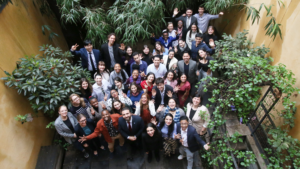 The knowledge about reproductive health, especially about my body, is a component that I acquired three months ago. As a 21-year-old, I acknowledged the importance of knowing about me. However, it is inevitable to learn how even after so many years I never knew how my body really works. Sadly, there are many young people in the world just like me. That is why I decided to join a battle that empowers and thinks about the uniqueness and singularity of us as women and not one that “empowers” by making women use artificial contraceptives that do not meet their real needs.
The knowledge about reproductive health, especially about my body, is a component that I acquired three months ago. As a 21-year-old, I acknowledged the importance of knowing about me. However, it is inevitable to learn how even after so many years I never knew how my body really works. Sadly, there are many young people in the world just like me. That is why I decided to join a battle that empowers and thinks about the uniqueness and singularity of us as women and not one that “empowers” by making women use artificial contraceptives that do not meet their real needs.
A society that has fear, rejection, and stigma about reality is a society that does not succeed and does not face the problems that lead to deficiencies. The menstrual cycle, fertility and, in general, reproductive health are essential components and part of the nature of women. But apparently history and time have not overcome the gaps for which many consider these to be a sin, a punishment or even an illness. In response, and with the rise of many interest groups rooted in ideologies, women are given the option to adapt to artificial contraceptives to feel “empowered”. But is it really this option that makes a woman empowered?
Misinformation and misrepresentation of media and ideologies have built a world in which artificial contraceptives are synonymous with empowerment. But what happens is that women do not get enough knowledge to understand their bodies and make the best decisions about their health care. The paradigm now is discrimination and the lack of opportunities for all those women who do not identify with the health discourse on family planning that leads the international arena. This discourse says that, globally, there are 222 million women have unmet needs in family planning. Solutions that lead women to empowerment and increase health outcomes exist, but this society has repressed them.

Some of the reasons why this method is not comprehensive comes down to the fact that, in the first instance, many women are unable and not willing to use contraceptives due to health problems, personal, cultural concerns or even religious beliefs. Secondly, evidence shows that the effectiveness rates in artificial contraceptives are fairly high but are potentially destructive due to their side effects.[1] These factors lead many women to stop using the method regardless of improvements in the quality of it. The discourse of unmet need for family planning strongly demands for a method that has high user satisfaction, does not have side effects, and is effective.
After learning this information and acknowledging its importance, it was then that I discovered Fertility Education and Medical Management (FEMM). It requires daily monitoring of a woman’s cycle and has effectiveness rates. Best of all, it has no side effects and allows monitoring of underlying conditions. At FEMM, I discovered that women could understand how their bodies work. Based on this, they can make informed and empowered decisions about their health which is important for the professional, social, and economic aspects of their lives.
[su_divider top=”no” size=”1″ margin=”10″]
Published: June 17, 2020
Written by Paula Lopez, a WYA Advocacy Intern from Colombia
[1] The Case for FEMM. White Paper. Meghan Grizzle Fischer. Reviewed by Dr. Pilar Vigil. October 2013. New York, New York. Pg. 34.







